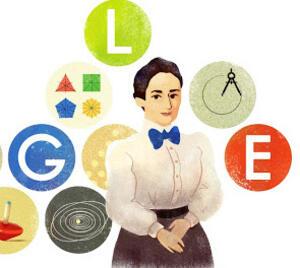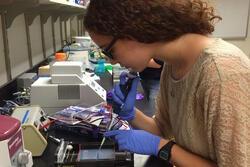Shining a Light on Mathematical Brilliance
An edited version of the Google Doodle that appeared to celebrate Emmy Noether's 133rd birthday on March 23, 2015.
Over the past 106 years, 48 women have been honored with the Nobel Prize. Amalie Emmy Noether, a German Jewish mathematician who is now known as the “mother of abstract algebra,” is not one of them. At the time of her death in 1935, Albert Einstein wrote, “In the judgment of the most competent living mathematicians, Fräulein Noether was the most significant creative mathematical genius thus far produced.” Despite this stunning praise and some recognition (Noether received the Alfred Ackermann-Teubner Mathematical Prize for the advancement of mathematical knowledge in 1932), few outside the worlds of mathematics and physics knew of her and her contribution.
Noether was born in Erlangen, Germany on March 23, 1882. She came from a mathematical family (her father, Max Noether, was a famous mathematician) but women were barred from officially enrolling in university classes in Germany. Despite not being allowed to register for classes, she was permitted to take the exams. As a result of her persistence, Noether received her doctorate in 1907 when she was 25, without officially taking any courses.
From 1907 until 1915, Noether taught at the University of Erlangen, where her father was a mathematics professor. Women were prohibited from receiving compensation for academic teaching, so Noether lectured without a paycheck. Happy just to think and talk about math, she worked without an official title and lived in near-poverty. It’s possible she simply considered it a privilege to teach at the university, and though she wasn’t compensated, her presence and dedication broke the gender barrier for women in mathematics and academia in Germany.
The mecca of mathematics at the time was the University of Göttingen. David Hilbert, a renowned professor there, entered into a race with Einstein to prove the general theory of relativity, and recruited Noether for her impressive knowledge of invariants. In Göttingen, Noether lectured and published articles, many under Hilbert’s name—all without pay. There, she accumulated a circle of disciples, dedicated students who were known as “Noether’s boys.”
For Noether, math was fun—she would write postcards to colleagues that contained mathematical problems. During this productive time, she published her greatest contribution to physics, now known as Noether’s theorem. July 26, 2018, marks the centennial of the publication of Noether’s theorem, which was originally unveiled at the Göttingen Academy.
Amidst Noether’s research and publication, the world was changing. During World War I (1914-18), empires were toppled, borders were redrawn, and a new understanding of women as citizens began to emerge in Germany, because of their many contributions to the war effort. German women were given the right to vote in 1919 (a year before American women). That same year, Noether became an “unofficial associate professor,” similar to an adjunct today. By 1923, she was finally receiving a modest stipend for her teaching.
Meanwhile, outside the university walls, political chaos was looming. Hitler came to power in 1933, and Noether, along with other Jewish faculty, was fired. She, along with 85 of 145 other Jewish mathematicians, fled to the United States.
Around the same time that Einstein joined the newly formed Institute for Advanced Studies at Princeton, Noether obtained a one-year position at nearby Bryn Mawr. She enjoyed Bryn Mawr for its peace and serenity and became accustomed to life in America, even giving several lectures at the Institute in Princeton. Tragically, this peaceful existence was cut short the next year when she died after surgery for a tumor. She was 53.
Though Noether’s brilliance went largely unrecognized during her time, she navigated sexism and anti-Semitism on a daily basis in order to pursue her love of mathematics, paving the way for other women in STEM. The world is starting to celebrate this pioneering “mother of abstract algebra.” Thanks to the writings of her students, both in Germany and at Bryn Mawr, Noether’s name has become more widely-known. There are scholarships and lectures in her name around the world. There’s a high school in Erlangen named for Noether. In Israel, Bar-Ilan University established the Emmy Noether Institute for Mathematics. In Canada, the Emmy Noether Circle champions women in science. And, in probably the highest form of 21st-century recognition, Google celebrated the 133rd anniversary of Noether’s birth with a Google doodle in 2015.
A version of this blog post can also be found at the Leo Baeck Institute's website.







